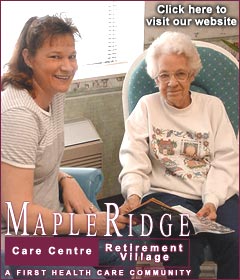|
Features,
Animals for Adoption,
Out and About,
Calendar
Travel News Elsewhere (fresh
daily from the Web)
Home and Garden News Elsewhere
(fresh daily from the Web)
|
|
Features
|
|
Get out your favorite recipes
and become a part of history
[JAN.
31, 2003]
The Zonta Club of Lincoln is
sponsoring a cookbook in honor of Lincoln's Sesquicentennial this
year.
|
|
You are invited to be a part in the
historical cookbook venture. Your family favorites and specialties
will help make the cookbook a highlight of Lincoln's celebration.
Your name will be featured along with your recipes. If you have
special memories of the recipe, please include them as well.
On May 1, a few months before the
city's 150th anniversary, Zonta Club of Lincoln is celebrating its
46th anniversary. Zonta is a classified service organization of
executive and professional women.
For over 40 years Zonta Club of
Lincoln's major fund-raiser has been an annual turkey dinner served
the first Sunday in November. Monies raised support various service
projects locally as well as internationally.
Zonta Club of Lincoln is very
appreciative of the community's continued support of our annual
dinner. We all share in the success of the club's service projects.
By working together, we have made a difference in our communities
and the world in which we live.
In 1981, Zonta also implemented a
health career scholarship program. Approximately 50 area residents
have benefited from the scholarship program. There are now nurses,
pharmacists, physical therapists, occupational therapists, a
dentist, chiropractor, obstetrician/gynecologist, cardiologists,
optometrist and others who have completed their studies and are in
private or clinic practices today. Don Sielaff, M.D., and Todd Nobbe,
O.D., are two doctors who were scholarship winners and have returned
to Lincoln for their practices.

A study is being prepared of the
whereabouts and accomplishments of the scholarship winners. They are
truly part of Zonta Club of Lincoln's history. Zonta is extremely
proud of the scholarship program and pleased to have been able to
share a small part in the lives and career goals of the recipients.
The new project, the cookbook, will
feature recipes from current, former and future Zontians. The club
also encourages this year's students to submit a recipe. Recipes
will be included from scholarship recipients, area restaurants over
the past years, and many families and friends of our community.
Please join Zonta in compiling Lincoln's favorite recipes of the
past 150 years.
Recipe forms are available locally at:
You may also
send recipes to the cookbook chairwoman, Judy Awe, 123 Crestwood
Drive, Lincoln, IL 62656-1360. Be sure to include your name and
address.

[to top of second column in this
article]
|

Please submit recipes before March 15.
Also please indicate if you are
interested in reserving a copy of the cookbook. They will be
available this summer.
Profit from the cookbook sales will be
used for Zonta service projects.
Highlights of Zonta service projects over the past 46 years
Abraham Lincoln Memorial Hospital --
camp for diabetic children; hospice; Lifeline; intensive care;
oncology; obstetrics/gynecology
American Diabetes Association -- camp
scholarships for diabetic children
All local and area nursing homes
Local schools
Crime Stoppers
Community Action -- Head Start
Heritage in Flight Museum -- Amelia
Earhart recognized by Zonta International
Jaycee Playground
Lincoln Community High School
Lincoln Park District
Lincoln Public Library
Lincoln Swim Club
Lincoln-Logan Underwater Search and
Recovery
Logan County Food Pantry
Logan County Health Department
Reading is Fundamental
Ronald McDonald House
T.O.U.C.H.
Eye Clinic for children
Sojourn Shelter for women
Living Alternatives, Crisis Pregnancy
Habitat for Humanity
Domestic violence prevention
Salvation Army

Zonta
objectives
To provide service at the global and
local level;
To improve the legal, political,
economic, educational, health and professional status of women;
To work for the advancement of
understanding, goodwill and peace through a work fellowship of
executives in business and the professions;
To promote justice and universal
respect for human rights and fundamental freedoms;
To be united
internationally to foster high ethical standards, to implement
service programs, and to provide mutual support and fellowship for
members who serve their communities, their nations and the universe.
[Zonta Club of Lincoln news
release] |
|
|
Time to organize
household records
[JAN.
18, 2003]
URBANA -- The beginning of
the year is an excellent time to organize and update family and
household records, says Mary Ann Fugate, University of Illinois
Extension educator in consumer and family economics. Doing this
gives record keepers a jump start on the inevitable income tax
season. It's also a good way to keep close tabs on where a family's
money goes and to take inventory of the family's present financial
status.
|
|
Fugate recommends getting started by
gathering all receipts and documents from 2002, then considering
what should be kept and what can be pitched.
For income tax purposes, the law
requires that people keep all records that enable them to complete
their tax return. "They should hold onto all receipts, canceled
checks, vouchers and other evidence to help them verify amounts
claimed and deductions for credits," said Fugate. "All such
documentation should be kept for at least six years, and all medical
bills should be kept for three years to back up the taxpayer's
canceled checks."
But it isn't necessary to save
everything. Record keepers can lighten the load by discarding checks
and bills that no longer serve a purpose. For example, people who
are paid in weekly or monthly salary statements can throw these
statements away after checking them against their annual W-2 form.
Or they can save the year-end statement with the cumulative total
for the year.
"This is also a good time to update
household inventory records," said Fugate. "If fire or burglary
occurs in the home, this record will help families remember what has
to be replaced and how much each item is worth. They might find that
they need to increase their insurance because their possessions are
worth more than they thought."
For each item in the family inventory,
include model number, brand name, dealer's name, a general
description, how much it cost, when it was purchased and what it
would cost to replace it. Taking pictures of the rooms and household
possessions now will make future identification or replacement
easier.
To download a free copy of Extension's
64-page publication "Household and Personal Property Inventory," go
to http://www.ag.uiuc.edu/%7Evista/
abstracts/ahouseinv.html.
[to top of second column in
this article]
|
A net worth statement is a good way to
keep tabs on personal and family possessions, says Fugate. Net worth
can be determined simply by adding the value of all the family owns
and subtracting the total of all that they owe. If this is done
annually, record keepers can quickly see whether they are getting
ahead financially or falling behind, and, in either case, how fast
it is occurring.
This is a good time for families to
consider their present situation in light of major goals, such as
retirement. University of Illinois Extension has developed eight
easy-to-use checklists to help you gather and organize important
documents, become acquainted with investment and retirement income
options, and keep your plan on track as you move from step to step
in the process. To order "Your Retirement Planning Checklist" for
$16, call 1 (800) 345-6087 and request publication C1376.
When family records have been
organized, updated and evaluated, it's time to put papers in their
proper location. Important documents that are difficult to replace,
such as birth certificates, death certificates, marriage
certificates, divorce papers, adoption papers and any other document
that is either government- or court-related, should be secured in a
safe deposit box.
Family and
household records that are kept at home should be stored in one
location. Proper storage of family records can be as elaborate as
setting up a home office or as simple as investing in an accordion
folder that can be kept under the bed, said Fugate.
[U of I news release] |
|
|
Animals for Adoption |
|
At Logan County Animal Control —
(Updated 2/1/03) |
DOGS
Big to little, most of these dogs will make wonderful
lifelong companions when you take them home and provide solid,
steady training, grooming and general care. Get educated about what
you choose. If you give them the time and care they need, you will
be rewarded with much more than you gave them. They are
entertaining, fun, comforting, and will lift you up for days on end.
Be prepared to take the necessary time when you bring home a
puppy, kitten, dog, cat or any other pet, and you will be blessed.
[Logan County Animal Control is thankful for pet supplies donated by
individuals and Wal-Mart.]
|
|
Warden Sheila Farmer and her assistant, Polly Farmer,
look forward to helping you.
|
|

[Hi! I'm Mike! I'm a 2- to 3-year-old male looking
for a family. My favorite activities include watching my
breath and licking your face.] |

[This is Jeff. Jeff is a 1- to 2-year-old mixed breed
looking for a good home.] |
|

[Just look at those faces! These 9-week cuties love to
roll and tumble and play.
But don't let their small size fool you. They are
Boxer-Collie mixes, so they'll get quite a bit bigger!] |
|
Want your ad to be
seen all over Logan County?
Advertise with
Lincoln Daily News!
Call (217)
732-7443
or e-mail
ads@lincolndailynews.com |
Our staff offers more than 25 years of experience in the
automotive industry.
Greyhound
Lube
At the corner of Woodlawn and Business 55
No Appointments
Necessary |
Lincolndailynews.com
is the place to
advertise
Call (217) 732-7443
or e-mail
ads@lincolndailynews.com |
|
|
|
Ten reasons to adopt a shelter dog
1. I'll bring out your playful side!
2. I'll lend an ear to your troubles.
3. I'll keep you fit and trim.
4. We'll look out for each other.
5. We'll sniff out fun together!
6. I'll keep you right on schedule.
7. I'll love you with all my heart.
8. We'll have a tail-waggin' good time!
9. We'll snuggle on a quiet evening.
10. We'll be best friends always.
|
|
|
CATS
|
|
[Logan County Animal Control is thankful for pet supplies
donated by individuals and Wal-Mart.] |
|
Warden Sheila Farmer and her assistant, Polly Farmer, look
forward to assisting you. |
In the cat section there are a number of wonderful cats to
choose from
in a variety of colors and sizes.
Farm cats available for free!
|

[This big boy is Sam.
Sam’s a little pushy, so no small kids, please.] |

[This fine looking girl is Snake. She’s just a kitten, and
she’s ready to slither her way into your heart.] |

[Snowball and Sunshine, a beautiful girl-boy pair, can’t wait
to bring joy and warmth into your home.] |
|
 |
|
|
These animals and
more are available to good homes from the Logan County Animal
Control at 1515 N. Kickapoo, phone 735-3232.
Fees for animal
adoption: dogs, $60/male, $65/female; cats, $35/male, $44/female.
The fees include neutering and spaying.
Logan County Animal Control's hours of operation:
Sunday
– closed
Monday –
8 a.m. - 5 p.m.
Tuesday –
8 a.m. - 5 p.m.
Wednesday –
8 a.m. - 5 p.m.
Thursday –
8 a.m. - 5 p.m.
Friday –
8 a.m. - 3 p.m.
Saturday –
closed
Warden: Sheila Farmer
Assistant: Polly Farmer
In-house veterinarian: Dr. Lester Thomson
|
|
|
|
 |
|
Researchers seek help
from anglers
[FEB.
15, 2003]
Researchers at the
Illinois Natural History Survey's Lake Michigan Biological Station in Zion
are seeking assistance from anglers who fish this region of Illinois
in reporting non-native species of carp.
|
|
Several non-native species of carp have
been introduced into the aquatic ecosystems of Illinois and are
thriving in a wide variety of ecological niches. The species include
the common carp, big-head carp, silver carp, grass carp, round goby
and Eurasian ruffe.
"All these exotic fishes have the
potential to cause severe environmental damage to aquatic systems,"
said John Dettmers, director of the INHS Lake Michigan Biological
Station.
To prevent movement of these species
between Lake Michigan and the Illinois River, an electric barrier
has been installed in the Chicago Sanitary and Ship Canal near
Romeoville.
"There are three ways individuals or
angling groups can help. They can spread the word about the danger
of these fish, report to researchers any tagged carp that are caught
and report non-native fishes caught," Dettmers said.
Many non-native carp could have been
moved by anglers. At least, that's how scientists think some
nuisance species have spread.
"Scientists will surgically implant
transmitters in common carp and place some above and some below the
barrier. If the barrier is working properly, none of these fish
should be able to get from one side to the other. If they do,
managers will have to increase the strength of the electric field
before the big-head and silver carp reach this part of the canal,"
Dittmer said.
So scientists will rely, in part, on
anglers to report tagged fish.

[to top of second column in this
article]
|

Dittmer says that silver carp and
big-head carp are moving up the Illinois River at about 40 miles per
year. Big-heads are expected to be at the barrier site as early as
April.
"These two species would probably
out-compete highly valued species, such as yellow perch, if they get
into the Great Lakes," Dittmer said.
The fish have one tag that says "Do not
consume" and another that gives the phone number for the Lake
Michigan Biological Station. It is important for INHS researchers to
be notified of the time, day and location where any tagged common
carp were caught.
"By learning where these tagged fish
were caught, researchers can determine whether the fish passed
through the barrier and learn more about carp movement patterns,"
Dittmer said.
The contact person is John Dettmers,
Lake Michigan Biological Station, Illinois Natural History Survey,
400 17th St., Zion, IL 60099; voice phone (847) 872-8677; fax (847)
872-8679.
In a few
years, black carp may also be coming up the river toward Lake
Michigan. Researchers already know that round gobies have made it
through the canal from Lake Michigan into the upper Illinois River.
Another species eventually expected to move from Lake Michigan
downstream is the Eurasian ruffe.
[University of Illinois news
release] |
|
Back to top |
News |
Sports | Business
| Rural Review |
Teaching & Learning |
Home and Family |
Tourism |
Obituaries
Community |
Perspectives |
Law & Courts |
Leisure Time |
Spiritual Life |
Health & Fitness |
Calendar
Letters to the Editor
|
|

